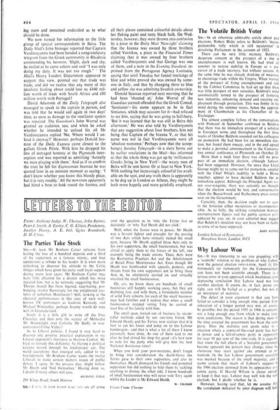The Volatile British - Voter
Sta,—In an otherwise admirable article about past elections, Robert Blake refers to Baldwin's 'incom- prehensible folly which is still mysterious' in dissolving Parliament in the autumn of 1923.
There can be very little mystery. Baldwin's desperate concern at the prospect of a rise in unemployment is well known. He had tried all summer to restore stability in Europe as a pre- cursor of a trade recovery, but without success. At the same time he was already thinking of measures to encourage trade within the Empire. When warned of the prospect of rising unemployment and told by the Cabinet Committee he had set up that there was little prospect of new remedies, Baldwin's mind automatically turned to the prospect of fostering new industries, enhancing demand and creating em- ployment through protection. This was firmly in his mind during the summer recess, hence the appoint- ment of Chamberlain as his Chancellor of the Exchequer.
The almost complete failure of the conversations with Poincare in September confirmed to Baldwin that there was no immediate prospect of a solution in European terms and throughout the first three weeks of October Baldwin sounded out his colleagues on protection. He had been for an immediate elec- tion, but found them uneasy, and in the end agreed to make a personal announcement to the Conserva- tive annual conference at Plymouth on October 25.
More than a week later there was still no pros- pect of an immediate election, although January had been suggested. However, the news that Lloyd George might try to come out for protection, coupled with the Chief Whip's inability to hold a House together, appear to have decided Baldwin for an immediate appeal. Although the Principal Agent was not over-sanguine, there was certainly no thought that the election would be lost, and consternation when the Beaverbrook and Rothermere press turned sour on the Government.
Certainly, then, the decision ought not to seem to the historian either mysterious or incomprehen- sible. As to folly, the striking correlation between unemployment figures and the public opinion poll; adduced by you, sir, in your editorial may suggest that Baldwin's intuition may not have been so faulty as some of us have supposed.
JOHN BARNES London School of Economics, Houghton Street, London, WCI


































 Previous page
Previous page